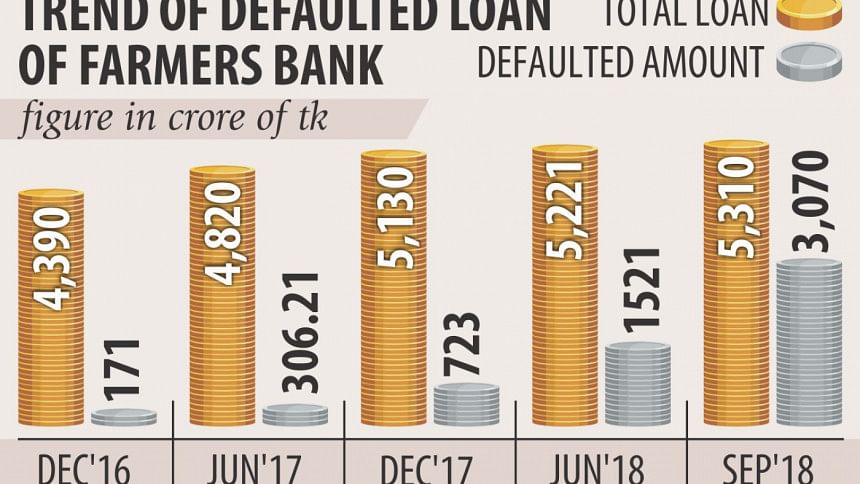Farmers Bank: Dramatic rise in loan default

With Farmers Bank, no-one knows when the woos will end. And as days go by, more and more depressing statistics are coming out.
Since it was hit by massive corruption and irregularities a year ago, much of which is blamed on its former founder chairman, the bank has never been able to turn any profit and its bad loan portfolio is continuously swelling as more and more loans, even the good ones, are failing.
It seems even the good borrowers, and very few were there, have suddenly realised that being delinquent is a better option.
Farmers Bank found itself in the middle of a raging controversy when it was unearthed that a big chunk of its loans was given without even any application for loans or that money was disbursed to dubious companies even before loans were approved.
The Bangladesh Bank had squarely held its former chairman Mohiuddin Khan Alamgir, an AL lawmaker who got the ticket to run in the upcoming elections, responsible for the scam. Alamgir resigned from the board in the face of controversy although he denied his involvement in the scam. Neither the regulator nor the anti-corruption commission further pursued the scam as if the mere resignation ended the matter.
It did not.
Farmers could not recover any of the loans it had disbursed and ticked them classified. But more strikingly, since the bank went virtually bust in 2017, it failed to recover its unclassified loans too.
This means even the loans that were regular at the time of its falling into trouble are becoming irregular, putting more pressure on the bank's health, which the central bank is trying to restore.
Farmers could not recover a single penny of its Tk 4,198 crore unclassified loans in April-June quarter. Of its Tk 1,521 crore classified loans, it could make a meagre recovery of Tk 2 crore only, central bank data shows.
For any classified loans, the banks have to maintain provision – in other words, the banks set aside money equal to the amount of classified loans. This money it cannot show as profit.
So as the figures go, Farmers had 29 percent of its total loans as default in June this year. But in September, the figure shot up to an astounding 58 percent or Tk 3,070 crore.
Such dismal performance led the Bangladesh Bank to recently warn Farmers, according to central bank sources.
These latest developments only reflect how deep the problem with Farmers is. When it sank with corruption and irregularities, the government made a bailout attempt by forcing the four state-owned banks and state investment company, the Investment Corporation of Bangladesh, to buy Tk 715 crore equity of the ailing bank.
This move speaks more of politics than economics. There is no explanation why an investment company that should look after the investors' interest and put money in profitable ventures chose Farmers instead. Why the state-owned banks which run on public money should squander their funds on a sinking bank? In simple terms, this became a classic case of transferring people's money into scamsters' pockets.
Even after the banks came to its rescue, Farmers is still at its former abysmally low state. Its depositors who have claimed their money back could not get any. Thirteen companies which deposited Tk 830 crore with Farmers had claimed back the money on maturity of terms. As the bank could not meet the demand, the matter remains pending with the central bank.
Farmers had gone on a deposit collection drive, putting up advertisements alluring savers. But public trust is running low and the campaign hardly had any impact. People are not interested in depositing money with a scam-hit bank.
Highly unusual for a bank, its deposit has been sliding. In December last year, the bank had a negative deposit growth of 5 percent and it became worse this June with the figure becoming 15 percent.
With such gloomy pictures emerging from the books, the managing director of the bank Md Ehsan Khasru at a recent event in Dhaka has said “one person more powerful than the central bank” is responsible for the systematic corruption in the bank.
He did not name the person, but Bangladesh Bank investigations have named Alamgir responsible for the scams.
The loan recovery is improving and the bank emphasised increasing cash flow to help end the crisis, Khasru told The Daily Star when contacted.
Deposit is coming into the bank but the outflow is bigger than the inflow, said the top executive of the bank.
In this perspective, the bank is trying to renew the deposits with the organisations which have matured fund with the bank, he added.
He said the bank has suspended lending until September, 2019, in accordance to the central bank's instruction.
The Bangladesh Bank first unearthed scams at the Farmers Bank in 2015 as it detected that Tk 400 crore loans were given without proper documentation and following procedures.
Later, another investigation in 2017 detected an even bigger Tk 500 crore scams of similar nature. The irregularities are gross -- some of those outright fraud -- ranging from sanctioning loans without any application to taking loans and not using any of that for the purposes those were meant for.
The central bank blamed Alamgir and ex-chairman of the bank's executive committee Mahabubul Haque Chisty for the scams.
Both Alamgir and Chisty resigned from the bank's board in November at the insistence of the Bangladesh Bank. Chisty was later arrested in April following a case by the Anti-Corruption Commission.
But these actions have not put Farmers back in shape. It remains a bank that never fails to cause concern, and it is costing the depositors and taxpayers.

 For all latest news, follow The Daily Star's Google News channel.
For all latest news, follow The Daily Star's Google News channel. 








Comments